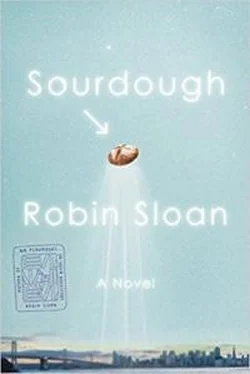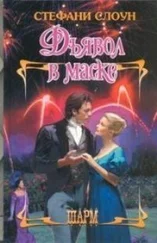The smocked mopper led me through a swinging door into the kitchen.
According to Horace, this was it. The hub, the heart. Sanctum sanctorum. The quiet workers before me—currently chopping, cleaning, carving, prepping, planning, all in matching smocks—would in time open restaurants, host TV shows, write bestselling cookbooks. I had penetrated the innermost crèche of California cuisine.
Where, as in Chef Kate’s kitchen, hip-hop was playing on a whoomphy Bluetooth speaker.
The smocked mopper glided through the kitchen and I followed her path as precisely as I could, wary of getting in anyone’s way. I kept my head down.
Then I saw the oven.
It was epic, with a pale stone dome, walls of black-lacquered brick, and a yawning mouth with a flicking, forking tongue of fire. The heat was palpable from across the kitchen. As I passed, a red-faced baker twirled a long wooden paddle—her arms were enormous—and sent it slicing into the oven to slip beneath two loaves at once. With a snap of her shoulders they were out, rough and crackly, uppermost edges singed black. Her bread looked even more rustic than Everett Broom’s, like some primordial ancestor from a harder epoch—one that required more armor. As I watched, she dropped the loaves into a line that was forming on the countertop, then gave the paddle another twirl, tossing it into the air as she did, a confident flourish intended for no one but herself.
“Awwwesommme.” I groaned it out loud without intending to. She heard me, and a wicked grin flashed across her face.
I spotted the baker’s starter sitting on the countertop in a widemouthed plastic tub. Its name was written on a band of peeling tape: CLINT YEASTWOOD.
The smocked mopper waited at the next door, impatient with my awe. I followed into a dark hallway lined with coats on pegs and shoes and boots on the floor, past a small washroom, around a corner.
We came to a door, slightly ajar. The smocked mopper knocked gently, and when the reply came—a crisp command to enter—she left me to discover on my own what waited within.
* * *
THE ROOM WAS LONG AND SKINNY, set up against the back of the building, with tall windows that offered a panoramic view of the restaurant’s backyard garden filtered through a veil of beans that climbed lengths of string pulled taut across the windows, their leaves softening the light that fell into the study.
Through the beans, I saw figures moving in the garden, filling baskets with greens. More acolytes, serene in their linen smocks.
At a small desk, Charlotte Clingstone sat in dappled bean-shadow. Before her were a laptop, an enormous pile of documents, and not one but three phones. She was poking at one of them as I entered. She glanced up with a look of annoyance.
It was definitely her: the central deity from the Ferry Building.
“Someone named Lawrence,” I said. “I talked to him on the phone … He said you would have time to see me. Around now.”
“Lawrence is very accommodating,” Clingstone said. She lowered her glasses and a look of recognition flitted across her face. “I know you. How do I know you?”
I hadn’t expected her to recognize me, but maybe the fact that I had presented her pantheon with something other than pickles had earned me a single sparking neuron.
I told her I was Lois Clary. I’d tried out for the Bay Area farmers markets … all of them … and been rejected.
“Oh, I hope you’re not here about that.” Pity and impatience mixed in her voice. She fiddled with her phones, moving them into a neat line. I wondered if she had a panic button mounted on the underside of her desk to call for help in case of confrontation by spurned farmers and/or simpering gourmands.
“I came to show you something.” I crossed the distance between us and extracted the copy of Horace’s menu from my bag. “This.”
She hitched her glasses up and peered at the menu. “Goodness.”
“Do you remember it?”
“Well, give me a moment.” Her eyes flitted across the paper. “I’ve made quite a few of these, you know. Hmm … 1979. This is ancient.” Her eyes scanned farther down, and something crossed her face. A softening. “Oh, yes. I do remember.” She looked up at me. “Where did you find this?”
“A friend of mine. Horace, he’s a—”
“Portacio. Of course.” She clucked. “It’s quite a hoard he’s gathered. I didn’t know I was part of it.”
“He has all your cookbooks, too.”
“A lot of people have my cookbooks. No one has these menus anymore. I wish I did.”
“I wanted to ask you about something specific. About this meal.”
“Go on.”
“The bread. Sourdough à la Masque. What was it? Where did it come from?”
Outside, the acolytes moved in the garden.
“It’s the most interesting thing on the menu, isn’t it?” Clingstone mused. “I don’t think that’s obvious. Am I remembering correctly—you’re a baker? Yes, I can see why you might be curious about this. Well. All right.”
She stood, slipped a manila folder under her arm, dropped a phone into each of her jacket’s pockets, leaving the third on the table. “Come along, then. I’ll explain.”
She led me out through the warren—past the washroom, the coats—and back into the kitchen, where it was a different thing entirely to enter in the presence of Charlotte Clingstone. Nothing outwardly changed—not one knife skipped a chop—but a crackling field of attention snapped into existence.
“Where’s Lawrence?” Clingstone called out. “Someone find Lawrence, please. His memory is required.”
Acolytes zipped out every door.
Clingstone glided over to the burly baker. “Mona,” she said sweetly. The baker glowed. Clingstone turned to me. “This is Lois. She bakes.”
Mona’s gaze cooled. I was an intruder in her domain.
Clingstone lifted one of the loaves from the line, tapped it on its back. “Lovely,” she cooed. She returned it to the line and lowered her glasses. “I’ve always thought the starter’s influence was overstated. People tell these wild stories—‘Oh, I got it from such-and-such, it’s been going strong since, you know, Sister Brunhilde began it in Gothenburg a hundred years ago,’ that sort of thing—but it’s all basically the same.”
“I agree,” Mona said. As if she had any choice.
“But,” Clingstone said, “there was an exception. Years ago. Look at this.” She handed Mona the menu I’d brought. “From 1979, you see? We were just starting. This was still Harriet Grayling’s house, and we were her wild young friends”—Clingstone seemed to apply some retroactive skepticism to this—“throwing these enormous dinners in her parlor. This kitchen was different. It was tiny.” She snapped her head around. “ Where is Lawrence? I need him to remember something.”
Two more acolytes went scurrying.
She turned back to Mona and me. “It was becoming a bit of a flophouse. Harriet didn’t mind. She was having the time of her life. It was that summer, I think, when Jim Bascule wandered through. A friend of someone’s … I can’t remember who. Lawrence!”
Another acolyte gone.
“He’d been in Europe. He’d met someone. They’d lived together in Brussels. She was a wonderful cook, apparently. She baked bread. He fell in love. Then she left, and he ran out of money. He showed up here with nothing but a beat-up old guitar and the sourdough starter she’d left behind.”
Around the kitchen, those acolytes who had not gone in search of Clingstone’s quarry tilted themselves to hear the story. This was precious history. Indoctrination.
“Jim Bascule played his guitar all day, singing sad songs. He might have been in a band. I can’t remember. I need Lawrence! But”—she clucked—“here was the surprise. Every morning, Jim baked. His lady had taught him well. The bread was wonderful, but also…” She paused. Looked from Mona to me with eyes that dared us to question what came next. “There’s no getting around it, is there? There were faces in the crust. These strange … sharp-edged…” She curled her fingers and made a face. An ecstatic mask. I recognized the spirit of it immediately. Her features returned to normal. “We ignored them. Those weren’t the strangest things we saw back then. Jim baked that bread every day for … six months? We paid him what we could. He saved it all up, until he had enough for a ticket back to Europe.”
Читать дальше










